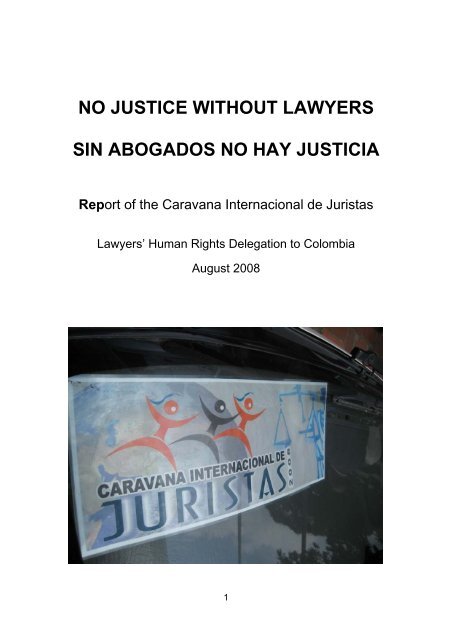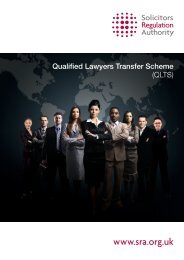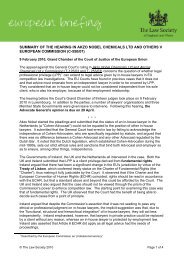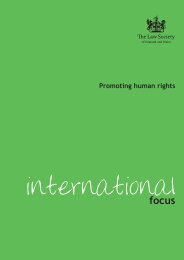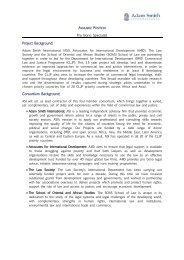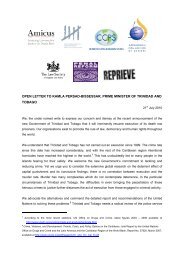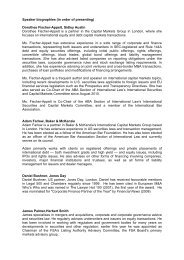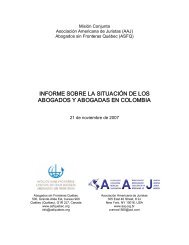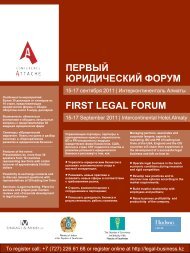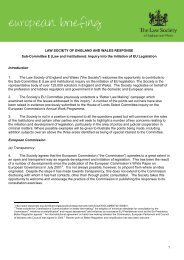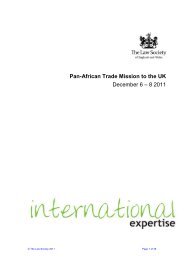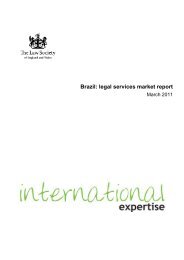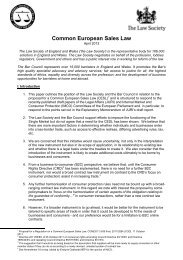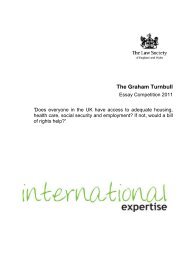no justice without lawyers sin abogados no hay justicia - The Law ...
no justice without lawyers sin abogados no hay justicia - The Law ...
no justice without lawyers sin abogados no hay justicia - The Law ...
You also want an ePaper? Increase the reach of your titles
YUMPU automatically turns print PDFs into web optimized ePapers that Google loves.
NO JUSTICE WITHOUT LAWYERS<br />
SIN ABOGADOS NO HAY JUSTICIA<br />
Report of the Caravana Internacional de Juristas<br />
<strong>Law</strong>yers’ Human Rights Delegation to Colombia<br />
August 2008<br />
1
Report of the UK Section of the “Caravana 2008”<br />
- an international delegation of <strong>lawyers</strong> to investigate the treatment of human<br />
rights <strong>lawyers</strong> in Colombia<br />
CONTENTS<br />
page <strong>no</strong>.<br />
Executive Summary 3<br />
Introduction 5<br />
Aims of the Caravana 7<br />
Background 8<br />
<strong>Law</strong>yers under Threat 9<br />
Impunity and Access to Justice 14<br />
Threats to the Independence of the Judiciary 19<br />
<strong>The</strong> Colombian Authorities 21<br />
Conclusion: support for human rights defenders 24<br />
Recommendations 25<br />
Appendix 1: <strong>The</strong> Colombian Court System 26<br />
Appendix 2: <strong>The</strong> Caravana Participants 28<br />
Appendix 3: Organisations we met in Colombia 29<br />
Addendum 30<br />
Fig 1.Press conference in Bogota<br />
2
Executive summary<br />
In January 2008 ACADEUM, an umbrella organisation of Colombian human<br />
rights <strong>lawyers</strong> invited foreign <strong>lawyers</strong> to Colombia to report on the killings,<br />
threats, and harassment to which human rights advocates are subjected<br />
there. When the <strong>Law</strong> Society called a meeting, there was an overwhelming<br />
response, from members of the Bar, ILEX and the <strong>Law</strong> Society.<br />
In August 2008, forty two members of the UK legal profession arrived in<br />
Bogota to join the ‘Caravana Internacional de Juristas’, (literally meaning<br />
‘International Caravan or Convoy of <strong>Law</strong>yers’), together with <strong>lawyers</strong> from<br />
Europe, Canada and Latin America for a high profile intensive one week<br />
inquiry from 24 th to 31 st August 2008. <strong>The</strong> inquiry began with an intensive two<br />
day briefing. <strong>The</strong> group was then divided for visits to examine the situation in<br />
seven representative regions. Underlining the need for the visit, shortly after<br />
our arrival, it was reported that a lawyer had been murdered in one of those<br />
regions.<br />
<strong>The</strong> aim of the delegation was to meet human rights advocates and to<br />
investigate the situation of <strong>lawyers</strong> and their clients, particularly those who<br />
had been subjected to human rights abuses, from unfair trials to<br />
assas<strong>sin</strong>ations. <strong>The</strong> delegation also hoped to help raise the profile of <strong>lawyers</strong><br />
and officials charged with defending human rights. We began this process<br />
with national and local TV and press coverage during our visit.<br />
We heard shocking and detailed eye witness accounts from individuals,<br />
backed up by documentary evidence. <strong>The</strong> Caravana met with organisations<br />
monitoring the assas<strong>sin</strong>ations, attacks and harassment suffered by <strong>lawyers</strong><br />
and other human rights advocates. We also met judges, police and<br />
prosecutors, embassy staff, senior central and local government ministers,<br />
academics, and commercial <strong>lawyers</strong>. <strong>The</strong> evidence we heard was confirmed<br />
in part by officials and accords with reports produced before and <strong>sin</strong>ce our<br />
visit by international organisations and previous <strong>lawyers</strong>' delegations.<br />
<strong>The</strong> courage of the Colombian <strong>lawyers</strong> and the significance of their work left a<br />
lasting impact on the UK delegation. We have initiated an international<br />
emergency email network to enable us to respond to threats to individuals by<br />
contacting the Colombian embassy and writing to senior officials up to the<br />
President. We are determined to ensure that our meetings with government<br />
officials and prosecutors who promised to investigate the assas<strong>sin</strong>ations,<br />
attacks and threats will lead to action to protect human rights <strong>lawyers</strong>.<br />
This report contains a summary of the testimonies given to the Caravana<br />
members. <strong>The</strong>re is also a longer report which contains the record of meetings<br />
and visits carried out by the Caravana members, which can be found at<br />
http://international.lawsociety.org.uk/<strong>no</strong>de/2518 web site. <strong>The</strong> UK delegation<br />
is planning a return visit to Colombia in 2010 to investigate what progress has<br />
been made by the authorities in reducing the level of human rights violations<br />
and to show our continuing support for our Colombian colleagues.<br />
3
Key Recommendations for future work by the UK delegation:<br />
• Publicise the lack of human rights protection in Colombia, the impunity<br />
afforded by the State to those who infringe human rights and the<br />
dangers faced by human rights advocates;<br />
• Participate in an international legal network to support those working in<br />
the human rights field in Colombia, to respond to emergencies, and to<br />
make representations to the Colombian authorities where those<br />
individuals appear to be in imminent danger;<br />
• Monitor threats, attacks, deaths and disappearances of human rights<br />
advocates and demand proper investigation;<br />
• Supporting the strengthening of <strong>lawyers</strong>’ organisations which defend<br />
human rights in Colombia<br />
• Supporting the <strong>lawyers</strong>’ organisations coordinating the free exercise of<br />
law and access to <strong>justice</strong> in Colombia<br />
• Maintain contact with Colombian colleagues and provide practical<br />
support, resources and specific assistance as asked;<br />
• Maintain constructive contact with the Colombian authorities to follow<br />
up on the assurances given to us;<br />
• Make representations to the UN, the EU, and UK parliamentarians and<br />
authorities outside Colombia, and in particular the governments of<br />
those jurisdictions represented in the Caravana;<br />
• Provide assistance to Colombian <strong>lawyers</strong> in the preparation of cases to<br />
be put before the Prosecutor of the International Criminal Court or the<br />
Inter-American Court of Human Rights.<br />
Thanks to all the following organisations for their support<br />
ACADEUM (Asociacion Colombiana de<br />
Abogados Defensores de Derechos<br />
Huma<strong>no</strong>s Eduardo Umena Mendoza)<br />
Foreign and Commonwealth Office officials<br />
British Embassy and Consulate<br />
<strong>The</strong> <strong>Law</strong> Society Charity<br />
<strong>The</strong> <strong>Law</strong> Society of England & Wales<br />
<strong>The</strong> Bar Council of England & Wales<br />
Institute of Legal Executives<br />
City of Westminster & Holborn <strong>Law</strong> Society<br />
Devon & Somerset <strong>Law</strong> Society<br />
Federation of European Bar Associations<br />
Peace Brigades International (UK)<br />
Myrna Mack Foundation<br />
<strong>Law</strong>yers Without Borders – Canada<br />
Asociacion Libre de Abogados de Madrid<br />
Ordre des Avocats de Paris<br />
DAV - Deutscher Anwaltverein<br />
4
Introduction<br />
Colombia is a dangerous place for human rights <strong>lawyers</strong> and<br />
defenders 1 .Human rights organisations have registered an average of 25<br />
cases of <strong>lawyers</strong> and human rights advocates (referred to here as<br />
‘defenders’) killed on a yearly basis <strong>sin</strong>ce 1991, 2 which amounts to 400<br />
people in a 16 years period (although official figures are lower). In addition,<br />
they face the risk of spurious criminal charges, civil suits and disciplinary<br />
charges forcing them to spend time defending themselves rather than<br />
representing their clients 3 .<br />
Our aim in travelling to Colombia was to give support to professional<br />
colleagues and to learn at first hand about the obstacles to their work and the<br />
threats they face (see Box opposite). We were invited by the Colombian<br />
<strong>lawyers</strong>' organisation ACADEUM 4 , as part of their campaign for the right to<br />
free exercise of their profession and access to <strong>justice</strong>: “Sin Abogados <strong>no</strong> <strong>hay</strong><br />
Justicia” – ("No Justice Without <strong>Law</strong>yers).<br />
We spent five days in Bogotá and, in separate groups, two days in each of<br />
seven regional centres 5 . We met with <strong>lawyers</strong> and other human rights<br />
defenders, government officials, judges, trade unionists and organisations<br />
representing internally displaced persons (IDPs), and peasant farmers 6 .Time<br />
did <strong>no</strong>t allow for detailed investigation but the information we gathered<br />
accords with reports produced by international organisations and previous<br />
<strong>lawyers</strong>’ delegations. 7<br />
Our diverse group included solicitors from England and Wales, barristers,<br />
members of the judiciary, the President of the Institute of Legal Executives,<br />
two local <strong>Law</strong> Society Presidents and four <strong>Law</strong> Society Council Members. We<br />
were joined by <strong>lawyers</strong> from Canada, Spain, and other jurisdictions in Europe<br />
and Latin America. We returned with shared concern for the difficulties and<br />
dangers faced by Colombian colleagues in seeking to uphold the rule of law,<br />
admiration for their courage, and commitment and determination to assist in<br />
whatever ways we can.<br />
We were able to achieve some of our aims in Colombia:<br />
1<br />
Informe sobre la situación de los <strong>abogados</strong> en Colombia. Comisión interamericana de derechos huma<strong>no</strong>s.<br />
ACADEUM, ASF Francia, y alii. Octubre 14 del 2003. On line ; http://www.casadelabogadoasf.org/IMG/informe_CIDH_2003.doc<br />
2<br />
Informe sobre la situación de los <strong>abogados</strong> y abogadas en Colombia, Abogados Sin Fronteras y Asociación<br />
Americana de Juristas, Diciembre 10, 2007, p.21-22. On line: http://www.aaj.org.br/InformeASFQ-AAJ.pdf<br />
3<br />
See Human Rights Defenders Trapped in their Own Defence, PBI International March 2008<br />
4<br />
Asociacion de Abodagos Defensores Eduardo Umana Mendoza – commemorating the name of an assas<strong>sin</strong>ated<br />
human rights lawyer.<br />
5<br />
Medellin, Cali, Turbo, Pereira, Eje Cafetero, Bucaramanga, and Barranquilla. One group remained in Bogotá. <strong>The</strong><br />
delegation was in Colombia from 24 to 30 August 2008.<br />
6<br />
See Appendix<br />
7<br />
See e.g. 2007 Annual Report of the UN High Commissioner for Human Rights on the Situation of Human Rights in<br />
Colombia (www.hchr.org.co/documentoseinformes/altocomisionado/2007/Report); Rule of <strong>Law</strong> – Report of a<br />
<strong>Law</strong>yers' Delegation to Colombia May 2006 (www.<strong>justice</strong>forcolombia.org) ; Report on the Situation of <strong>Law</strong>yers in<br />
Colombia December 2007 by Joint Mission of <strong>Law</strong>yers Without Borders Canada and (www.asfquebec.org) and<br />
American Association of Jurists (www.aaj.org.br); Ataques contra defensoras y defensores de derechos huma<strong>no</strong>s<br />
durante 2006. Coordinación Derechos Huma<strong>no</strong>s Colombia/Europa/Estados Unidos.<br />
5
• We raised the profile of human rights <strong>lawyers</strong> in Colombia through<br />
television broadcasts, newspaper reports and radio interviews.<br />
Interviews with members of our Cali delegation were broadcast on<br />
Colombian national television. A press conference in Bogota with Peter<br />
Burbidge and Sara Chandler from the UK, Denis L’Anglais from<br />
Canada, and Endika Zulueta, from Spain was well attended, and<br />
concluded with television interviews;<br />
• We also raised the profile of Colombian human rights defenders<br />
through numerous meetings with Government officials, prosecutors<br />
and the judiciary, as well as the national Embassies of the delegates<br />
attending the Caravana. A group of UK commercial <strong>lawyers</strong> went on to<br />
meet the Asociación Nacional de Empresarios de Colombia (ANDI) 8 , a<br />
bu<strong>sin</strong>ess association which includes <strong>lawyers</strong> who work in-house for<br />
commercial companies, in order to raise support for human rights<br />
defenders.<br />
• We obtained the commitment of the head of the Colombian President’s<br />
human rights team, Dr Carlos Franco, to launch an investigation into<br />
the assas<strong>sin</strong>ation of <strong>lawyers</strong>;<br />
• We built an international network of support between the participating<br />
delegates, especially between Canada, UK, France, Spain and<br />
Germany. This will carry forward the rai<strong>sin</strong>g of alerts when <strong>lawyers</strong>, law<br />
academics or law students are threatened, attacked, or killed.<br />
Fig 2. Peter Burbidge on Colombian TV reporting our findings<br />
8 http://www.andi.com.co/<br />
6
AIMS OF THE INTERNATIONAL CARAVANA<br />
<strong>The</strong> aims of the delegation were agreed with ACADEUM at the<br />
outset, so delegates knew what the aims were before joining<br />
the delegation.<br />
• To hear from local <strong>lawyers</strong>, and international monitoring<br />
organisations<br />
• To raise awareness in relation of the role of <strong>lawyers</strong> in the<br />
democratic <strong>justice</strong> system<br />
• To promote the right of <strong>lawyers</strong> <strong>no</strong>t to be linked to the<br />
cases of those they defend or to be persecuted for this<br />
reason<br />
• To de<strong>no</strong>unce persecution of <strong>lawyers</strong> in Colombia and<br />
human rights violations related to their professional work<br />
• To encourage legal actions, follow-up and monitoring of the<br />
human rights situation of Colombian <strong>lawyers</strong><br />
• To meet with Colombian Government officials to discuss<br />
our findings and to obtain full guarantees from the<br />
Government for the practice of the legal profession<br />
• To promote national recognition of the Human Rights<br />
Ombudsman’s Office (Defensoría del Pueblo)<br />
• To encourage national and international support for the<br />
work of <strong>lawyers</strong> in Colombia.<br />
7
Background<br />
Colombia has been the scene of armed conflict for the last sixty years<br />
between, on one side, the state together with paramilitary organisations,<br />
(many of which are widely ack<strong>no</strong>wledged to be state sponsored groups) 9 and,<br />
on the other side, left wing guerrillas. Para-militaries and guerrillas are both<br />
involved in narco-trafficking, extortion and other criminal activity.<br />
Throughout most of these years of violence Colombia has ostensibly<br />
remained a democratic state holding regular elections according to a<br />
constitution based on the separation of powers, and containing formal<br />
guarantees of human rights including the freedoms of expression and of<br />
association. Colombia is a party to most of the major international<br />
conventions 10 on human rights and was one of the original signatories to the<br />
Universal Declaration of Human Rights in 1948.<br />
However, it is apparent that in many respects these democratic rights and<br />
freedoms are ineffective. Violence and corruption by or on behalf of state<br />
agencies are wide-spread and victims are left <strong>without</strong> redress. Colombia has<br />
the highest proportion of internally displaced persons in the world apart from<br />
Sudan. According to the United Nations, 3.5 million people out of a total<br />
population of 45 million, have been driven from their land and homes. In many<br />
instances displaced people have been prevented from returning as their land<br />
has been turned over to large-scale industrial agriculture, in particular<br />
plantations of African palm to produce bio-fuels.<br />
Four key themes ran through our visit:<br />
• <strong>The</strong> dangers faced by <strong>lawyers</strong> and other human rights defenders;<br />
• Impunity - the failure of the state to take action against the perpetrators<br />
of murder, kidnapping and threats against critics and opponents of the<br />
prevailing social order and their legal representatives;<br />
• <strong>The</strong> lack of impartial law enforcement and of access to <strong>justice</strong>;<br />
• <strong>The</strong> importance of international legal <strong>no</strong>rms and international support<br />
to enable the establishment of human rights in Colombia.<br />
9 see eg Colombia – Amnesty International Report 2008, CCAJAR <strong>The</strong> false reality of the<br />
paramilitary demobilisation 10/10/06.<br />
10 Colombia is <strong>no</strong>t a party to the Convention on Enforced and Involuntary Disappearances, or<br />
<strong>The</strong> Optional Protocol to the Convention Against Torture<br />
8
<strong>Law</strong>yers under threat<br />
In Barranquilla on 24 August 2008, only two days before delegates arrived in<br />
that city, a lawyer, Jesus Escorcia Cortes, was shot and killed. A former<br />
Defensor del Pueblo 11 and k<strong>no</strong>wn for assisting trade unionists and victims of<br />
paramilitary violence, he thus became a<strong>no</strong>ther name on the list of murdered<br />
<strong>lawyers</strong> compiled by the Avocats sans Frontières (France) 12 office in Bogotá.<br />
By the end of August their list contained the names of 40 cases of threats,<br />
harassment and killings in 2008 alone. Overall, more than 400 <strong>lawyers</strong> have<br />
been killed <strong>sin</strong>ce 1991.<br />
• From 2000 to 2004: 70 <strong>lawyers</strong> dead, 8 disappeared, 11 in exile<br />
(Avocats sans Frontieres France)<br />
• 2004: 26 assas<strong>sin</strong>ations (CCAJAR, ACADEUM)<br />
• 2005: 25 assas<strong>sin</strong>ations (CCAJAR, ACADEUM)<br />
• 2007: 12 assas<strong>sin</strong>ations by 25 Sept 07(AAJ, ASFQ)<br />
• 2008: 40 cases by August 08 (ASF France)<br />
In all the regions visited, delegates were given similar accounts of killings,<br />
harassment and threats. <strong>The</strong> authorities were unable to name one<br />
prosecution for any of these crimes.<br />
In the capital Bogotá, the Caravana met with various organisations defending<br />
human rights. One of them, CCAJAR 13 , has seen a founder member<br />
assas<strong>sin</strong>ated and two others go into permanent exile as a result of<br />
paramilitary threats. <strong>Law</strong>yers working for CCAJAR travel in armoured cars,<br />
work in bullet-proof high security offices, wear bullet-proof vests, and live in<br />
houses fitted with bullet-proof glass but, as further protection, need the<br />
accompaniment of unarmed Peace Brigades International volunteers 14 .<br />
More and more individuals have asked for accompaniment by international<br />
observers Peace Brigades international because they consider themselves at<br />
risk when they exercise their professional duties among them is <strong>lawyers</strong>’<br />
group, CCALP 15 , which works in the countryside around Bucaramanga in<br />
Santander province, Northern Colombia. CCALP is named after Luis Carlos<br />
Perez, a<strong>no</strong>ther assas<strong>sin</strong>ated human rights defender. <strong>The</strong> administrator of<br />
CCALP showed delegates death threats received from the Aguilas Negras,<br />
the Black Eagles and told how paramilitaries first came to the area in 1998.<br />
Arriving in one town, Barrancabermeja, along access routes controlled by<br />
11 Sometimes misleadingly translated as "Public Defender's Office", the Defensoria del<br />
Pueblo is tasked under the Constitution with defending and protecting human rights against<br />
infringement by the state. See further Appendix 1.<br />
12 Casa del Abogado. Abogados <strong>sin</strong> Fronteras (Francia). On line:<br />
http://www.casadelabogado-asf.org/<br />
13 Corporacion Colectivo de Abogados Jose Alvear Restrepo www.colectivode<strong>abogados</strong>.org<br />
14 Peace Brigades International (PBI) provides volunteers to accompany human rights<br />
defenders under threat. www.peacebrigades.org<br />
15 Corporación Colectiva de Abogados Luis Carlos Perez.<br />
www.colectivode<strong>abogados</strong>luiscarlosperez.org<br />
9
army checkpoints, they had an<strong>no</strong>unced their presence by murdering seven<br />
people and removing a<strong>no</strong>ther 25 who have never been seen again. Since<br />
then 40,000 people had been killed, 500 forcibly disappeared and 120,000<br />
displaced people.<br />
CCALP works with indige<strong>no</strong>us groups and peasant farmer threatened with<br />
eviction from the land by the army and paramilitaries. <strong>The</strong>y are bringing a<br />
class action in the North Santander province. <strong>The</strong>y told us that presence of<br />
Texas Petroleum, and the Colombian state-owned Ecopetrol company has<br />
coincided with increased army and paramilitary activity in the area. As a<br />
result of Aguilas Negras threats two members of CCALP have been forced to<br />
flee the area.<br />
Also in Bucaramanga, a labour lawyer, Yolanda Silva Romero 16 recounted<br />
how in 2007 she received death threats when she challenged changes to the<br />
working conditions of teachers. After obtaining a judgement in the<br />
Constitutional Court she received a condolence card with a future date for her<br />
death as well as telephone calls to her home and work place threatening that<br />
she had until then to live. She remains convinced that the threats were from<br />
within the education administration. She complained to the authorities but <strong>no</strong><br />
action was taken. <strong>The</strong> local court failed to enforce the judgment.<br />
In the previous year Sra Romero's colleague, Adalberto Flórez Romero, had<br />
been victimised after winning a claim on behalf of a health worker who had<br />
been unfairly dismissed. In order to effect this judgement the worker met with<br />
the hospital administrator to arrange her re-employment and compensation. A<br />
local politician objected and reported Sr Flórez Romero, his client and the<br />
administrator to the local Fiscalia for procuring the signing of an unlawful<br />
agreement. To avoid being detained during the investigation, they all had to<br />
flee their homes and stay away for six months until the investigation had been<br />
concluded and Sr Florez Romero was absolved of all charges.<br />
<strong>The</strong> criminal investigation of Sr Flórez Romero is far from unique. <strong>The</strong> use of<br />
unfounded criminal proceedings against human rights defenders in Colombia<br />
has been documented previously. 17 Such accusations usually lead to<br />
detention during investigation and pending trial and force human rights<br />
defenders to spend time and resources on their own defence rather than<br />
helping others. Public stigmatisation, marginalisation and increased risk of<br />
paramilitary attack are additional consequences.<br />
Claudia Montoya, a lawyer in the central Colombian city of Medellin, spent<br />
three months in jail from 2006 – 2007. Whilst defending alleged guerrillas, she<br />
was herself accused of being a member of a guerrilla organisation by paid<br />
informers, at least one of whom had k<strong>no</strong>wn connections with a paramilitary<br />
commander responsible for kidnappings and massacres. Sra Montoya was<br />
charged and held on remand. <strong>The</strong> charges were dropped before trial but Sra<br />
Montoya, whose arrest and charge as a “terrorist” had been widely reported,<br />
16 Espitia & Florez Asociados; http//<strong>abogados</strong>trabajadores.com/mrco3.htm<br />
17 See eg UN High Commissioner Report ;Human Rights Defenders Trapped in their Own<br />
Defence, PBI Quarterly Newsletter Colombia No 6 March 2008.<br />
10
did <strong>no</strong>t receive any publicity for her acquittal and so has remained publicly<br />
stigmatised.<br />
Saskia del Rio, a lawyer in the North Eastern city of Barranquilla explained<br />
that she had taken over the work of defending alleged members of guerrilla<br />
groups from a colleague, Franklin Castañeda. He had been forced to<br />
relocate to Bogota after narrowly escaping assas<strong>sin</strong>ation in May 2006 when,<br />
apparently by mistake, an attempt was instead made on the life of his brother.<br />
On 14 August 2008 Sra del Rio, along with 35 other human rights defenders,<br />
found herself named on a hit list from the reconstituted paramilitary group<br />
Aguilas Negras, (Black Eagles) as a member of the guerrilla movement. Sra<br />
del Rio took the list to the police but they refused to help and accused her of<br />
writing the document herself.<br />
Over the previous 10 years in Barranquilla, delegates were informed, six<br />
human rights <strong>lawyers</strong> had been murdered and a<strong>no</strong>ther 10 had been forced to<br />
flee Barranquilla, leaving 12 to carry on with the work.<br />
Jose Humberto Torres, a<strong>no</strong>ther Barranquilla lawyer, had also been named<br />
on the Black Eagles hit list. In addition he had received e-mail threats, and<br />
during his 25 years in practice as a human rights lawyer he had been labelled<br />
a guerrilla, prosecuted and disciplined and suffered two attempts on his life.<br />
During 2005 he was forced to flee the country after he had been charged with<br />
procedural fraud during the defence of a trade union member. Subsequently<br />
he was also charged with rebellion and terrorism. <strong>The</strong> second set of charges<br />
was made after his name, along with those of other <strong>lawyers</strong>, had appeared in<br />
an official intelligence report, in which he was accused of participating in the<br />
kidnapping of a cattle dealer and being a member of a guerrilla organisation.<br />
<strong>The</strong>se charges were dropped because of a lack of evidence. <strong>The</strong> procedural<br />
fraud charges were also dropped after Sr Torres managed to prove that the<br />
Fiscalia had paid the witnesses to testify against him.<br />
<strong>The</strong> Consejo Superior de la Judicatura (Superior Council of the Judicature)<br />
has investigated Sr Torres twice, and given him a verbal warning for taking on<br />
too many clients at the same time, cau<strong>sin</strong>g problems in the area because of<br />
the lack of local <strong>lawyers</strong> technically prared and willing to represent with the<br />
same professional rigour as Sr Torres.<br />
Revelations during the recent trial of a paramilitary leader “Don Antonio” may<br />
have given an insight into how Sr Torres was targeted for assas<strong>sin</strong>ation. Sr<br />
Torres' personal details were found in the paramilitarys address book. During<br />
his pre-trial investigation “Don Antonio” gave evidence that the Government<br />
intelligence service, the DAS 18 , had asked him to assas<strong>sin</strong>ate Sr Torres and<br />
provided his details – and those of other targets - including photos and<br />
information about his home and work. He explained that this was because Sr<br />
Torres was a human rights defender.<br />
18 Departamento Administrativo de Seguridad.<br />
11
One of Sr Torres’ sons, who is also a lawyer, has received personal threats<br />
and most recently Sr Torres has been charged with contempt of court<br />
following a challenge to prosecution evidence on behalf of a client. <strong>The</strong> Court<br />
rejected Sr Torres’ submissions and charged him with contempt of court. He<br />
remains at risk of being suspended from practice.<br />
In Bogotá a defence lawyer, Fernando Quija<strong>no</strong>, described how he and his<br />
colleagues faced harassment, threats and persecution. His colleagues had<br />
been forced into exile. He himself had been forced to relocate. Only two<br />
weeks before meeting with the Caravana he had been threatened by the<br />
police.<br />
Claudia Erazo of the Yira Castro legal assistance organisation 19 reported the<br />
harassment they faced as a result of representing their clients. This included<br />
the theft of computer equipment and threats sent by email and telephone.<br />
None of those to whom the Caravana spoke in Colombia could think of a<br />
<strong>sin</strong>gle successful prosecution for the assas<strong>sin</strong>ation or harassment of a lawyer.<br />
Stigmatisation of <strong>lawyers</strong> as guerrillas is <strong>no</strong>t confined to those in private<br />
practice or to those who represent alleged guerrillas. <strong>The</strong> Permanent Unit for<br />
Human Rights (UPDH) 20 was set up by the municipality of Medellin. It has 43<br />
employees covering the city of 2.5 million and helps with complaints about<br />
violation of human rights by state forces and armed groups. <strong>The</strong> head of<br />
UPDH told us that a "demobilised" paramilitary leader had de<strong>no</strong>unced him as<br />
a member of the guerrilla organisation ELN 21 and UPDH as a guerrilla cell. A<br />
Colombian army general had publicly supported these accusations. As a<br />
result the families of the UPDH staff had received telephone threats and he<br />
had been followed.<br />
In the face of such threats it is <strong>no</strong>t surpri<strong>sin</strong>g that in many regions human<br />
rights <strong>lawyers</strong> are hard to find. In the coffee-growing region (Eje Cafetero)<br />
there appeared to be <strong>no</strong>ne. Students from the town of Manizales begged us<br />
for help in setting up a human rights organisation in their town. Currently, they<br />
said there was <strong>no</strong> access to legal representation.<br />
A trade unionist in the city of Pereira described how a leading local human<br />
rights lawyer of the Permanent Committee for the Defence of Human Rights<br />
CPDH) had been forced to flee to Bogota due to threats from paramilitaries.<br />
She had been a fearless advocate for human rights, demanding investigations<br />
of the murders of teachers and representing displaced street vendors<br />
following arson in the market where they worked. <strong>The</strong> threats against her<br />
were confirmed by the local head of the Procuradoria.<br />
19 Corporacion Juridica Yira Castro www.cjyiracastro.org.co<br />
20 Unidad Permanente para la Protección de los Derechos Huma<strong>no</strong>s)<br />
21 Ejercito Liberacion Nacional (National Freedom Army), the second largest guerrilla<br />
organisation.<br />
12
Fig 3. Aguilas Negras leaflet with threats to named <strong>lawyers</strong><br />
13
Impunity and Access to Justice<br />
Murders of <strong>lawyers</strong> are <strong>no</strong>t the only serious crimes left <strong>without</strong> investigation or<br />
prosecution. <strong>The</strong> International Commission of Jurists has stated that "Impunity<br />
is one of the hallmarks of the dire human rights record affecting Colombia.<br />
<strong>The</strong> vast majority of violations of human rights and breaches of humanitarian<br />
law are <strong>no</strong>t investigated or prosecuted and, even when investigations have<br />
been opened, they do <strong>no</strong>t result in identification of the perpetrators." 22<br />
Since 1986, 2,700 trade unionists have been murdered in Colombia 23 . In<br />
Bucaramanga, we were given a list of 122 local trade unionists who had been<br />
killed between 1 January 1991 and 21 November 2005. It included teachers<br />
and workers in petroleum and palm oil industries and in the health service.<br />
No-one had been prosecuted for these killings 24 .<br />
In the Eje Cafetero area, sixty-two teachers have been killed in the past<br />
decade. Two of the murders had occurred shortly before we arrived. A<strong>no</strong>ther<br />
teacher in that area had recently disappeared and probably been killed. Again<br />
there had been <strong>no</strong> investigation. No government official in the area could tell<br />
of a <strong>sin</strong>gle human rights case in which there had been a successful<br />
prosecution. Officials responded to concerns over human rights by suggesting<br />
that the attacks and murders were due to criminal rather than political<br />
motives. We found that difficult to accept <strong>sin</strong>ce the same officials also<br />
accepted that trade unionists, for example, were particular targets.<br />
Trade unionists continue to receive death threats from the para military<br />
groups including Aguilas Negras and the killings continue: 74 in 2007 and 28<br />
prior to our arrival at the end of August 2008. <strong>The</strong> previous month the body of<br />
Guillermo Rivera, president of Sinserpub, a public sector union, had been<br />
found in an a<strong>no</strong>nymous grave. <strong>The</strong> body showed signs of torture. He had<br />
been reported mis<strong>sin</strong>g on 22 April 2008 after witnesses had seen him being<br />
taken away by the police.<br />
Hannibal Mendoza, President of the Foundation of Displaced People in<br />
Bucaramanga, told us of the attempts to dismantle the trade unions in the<br />
African palm plantations of InduPalma 25 – a joint Colombian/French company<br />
- which owns 4,100 hectares 26 of land in la Sabana de Torres, Santander.<br />
Paramilitaries have killed 140 people, displaced 400, and forced the<br />
disappearance of 10 whose bodies have never been found. A<strong>no</strong>ther 10 are in<br />
exile. Those crimes were fully documented and reported to the local<br />
22 Attacks on Justice – Colombia International Commission of Jurists 2005.<br />
23 Some sources put this at a higher figure, see Justice for Colombia<br />
www.JusticeforColombia.org<br />
24 Ataques contra defensoras y defensores de derechos huma<strong>no</strong>s durante 2006.<br />
Coordinación Derechos huma<strong>no</strong>s Colombia/Europa/Estados unidos. On line:<br />
25 Cerca de Mil Empleos Generara Industria de Biocombusitbles. Semana. Dinero.com.<br />
www.dinero.com/wf_ImprimirArticulo.aspxISref=36593&IdTab=1<br />
26 A hectare is 2,471 (2.4)acres which is the equivalent of 10 000 square metres. Indupalma<br />
owns 41 million square meters of land.<br />
14
prosecutor. At the time of the Caravana there was <strong>no</strong> k<strong>no</strong>wledge of any<br />
resolution of the documented cases or any break in the cycle of ipunity.<br />
In this context the "Justice & Peace" process for the "demobilisation" of<br />
paramilitaries, instituted by President Uribe in 2002 soon after his<br />
inauguration, received much criticism. We were told that paramilitaries were<br />
given de facto amnesties, provided that they were <strong>no</strong>t under investigation at<br />
the time they agreed to lay down arms. Given the fact that most paramilitary<br />
crimes had never been under investigation, tens of thousands, including those<br />
guilty of mass murders in the most horrific circumstances, have gone free.<br />
<strong>The</strong> truth about their crimes and the identities of the organisers, financiers and<br />
intellectual authors of those crimes have been covered up, and victims <strong>no</strong>t<br />
given proper reparation or the opportunity to confront the perpetrators.<br />
At our first meeting in Bogotá a speaker from MOVICE 27 , the Movement for<br />
the Victims of State Crimes, described this process as "structural impunity".<br />
We heard similar criticisms from judges and <strong>lawyers</strong>, including some working<br />
in state institutions. <strong>The</strong>y echo the findings of international organisations who<br />
have reported on Colombia and <strong>lawyers</strong> whose visits preceded ours 28 .<br />
<strong>The</strong> law and procedures of the Justice & Peace process, we were told, are<br />
fundamentally flawed. <strong>The</strong> Colombian Supreme Court of Justice appears to<br />
agree. It has held that the original legislation, <strong>Law</strong> 782/2002, should <strong>no</strong>t apply<br />
to paramilitaries. However, the Government has taken <strong>no</strong> steps to prosecute<br />
the paramilitaries, whose amnesties are, as a result, questionable and instead<br />
has accused the Supreme Court of having an "ideological basis" and acting in<br />
opposition to the Government.<br />
Between 2002 and 2006 the Government claimed that over 30,000<br />
paramilitaries demobilised. Not more than 10% went through the Justice and<br />
Peace process; only 2% went through any form of investigation. In 2007 <strong>no</strong>t a<br />
<strong>sin</strong>gle indictment was laid. When hearings take place the information provided<br />
by the ex-paramilitary is frequently incomplete and untruthful. Members of our<br />
delegation who witnessed a hearing were disappointed in the responses of<br />
the ex-paramilitary who stated that he was unable to remember any of the<br />
incidents about which he was questioned. Ex-paramilitaries, we were told, use<br />
the hearings to justify, or even to take credit, for their actions. <strong>The</strong> United<br />
Nations Commissioner for Human Rights has commented in her 2007 Report<br />
that many victims perceive the process "as a form of re-victimisation that<br />
offends their personal dignity and sense of <strong>justice</strong>." 29<br />
27 Movimiento de Victimas de Crimines de Estado<br />
28 See eg Rule of <strong>Law</strong> – Report of a <strong>Law</strong>yers' Delegation to Colombia May 2006<br />
(www.<strong>justice</strong>forcolombia.org) ; Report on the Situation of <strong>Law</strong>yers in Colombia December<br />
2007 by Joint Mission of <strong>Law</strong>yers Without Borders Canada and (www.asfquebec.org) and<br />
American Association of Jurists (www.aaj.org.br);<br />
29 2007 Annual Report of the UN High Commissioner for Human Rights on the Situation of<br />
Human Rights in Colombia<br />
(www.hchr.org.co/documentoseinformes/altocomisionado/2007/Report);<br />
15
Prosecutors told us that the resources given to the process are insufficient.<br />
<strong>The</strong>re are 41,400 documented cases of human rights abuses. <strong>The</strong> process<br />
only provides for 10 months of investigation and there are <strong>no</strong>t e<strong>no</strong>ugh<br />
investigators and prosecutors. <strong>The</strong> Defensoria del Pueblo (see Appendix 1)<br />
had 121,547 victims registered. This leads to the slow procedures and lack of<br />
decision making, which are among the hallmarks of impunity.<br />
That is despite the priority which seems to be given to the Justice & Peace<br />
programme within the prosecution service, the Fiscalia, and the dislocation<br />
this produces in other areas of work. <strong>The</strong> Chief Prosecutor in Cali told us that<br />
the number of prosecutors allocated to the programme had increased from 25<br />
to 260 and the investigators from 80 to over 800. <strong>The</strong> most experienced<br />
prosecutors were being recruited to the programme, leaving the prosecution<br />
service with inexperienced <strong>lawyers</strong> for other cases.<br />
Many of the major paramilitary figures are wanted in the United States for<br />
drug trafficking and we were told by victims’ organizations that extradition was<br />
used by the Colombian authorities as a means of avoiding embarras<strong>sin</strong>g<br />
information emerging in Justice and Peace hearings. 30<br />
A Fiscal in central Colombia commented to us: "<strong>The</strong> extradition of<br />
paramilitaries and interference in the <strong>justice</strong> system and in finding truth and<br />
reparation for victims make it difficult to gain any guarantee and respect for<br />
the rights of victims. Extradition doesn’t respect the fundamental need for<br />
<strong>justice</strong> in Colombia."<br />
If the resources given to state prosecutors are insufficient, the position of<br />
victims is even worse. No help is given to enable them to travel the<br />
sometimes huge distances necessary to reach the few regional centres where<br />
the hearings take place. No arrangements are made for their security while<br />
attending the hearings or travelling.<br />
In Barranquilla we attended a hearing of the Justice & Peace process.<br />
Paramilitary and victims are kept in separate rooms. We sat with the victims<br />
and on a big screen watched the questioning of a demobilised paramilitary<br />
about events in which he may have participated. Victims could send their own<br />
questions to the prosecutor in the next door room. It was a frustrating process<br />
as very little information was gleaned from the questioning of the exparamilitary,<br />
whose frequent response to the Prosecutor was that he could <strong>no</strong>t<br />
remember the incidents about which he was being questioned. A victim in the<br />
room with us became upset and started protesting. <strong>The</strong> Defensoria del Pueblo<br />
lawyer allocated to represent her ig<strong>no</strong>red her distress. One of the <strong>lawyers</strong><br />
30 One example involved Carlos Mario Jiménez, alias Macaco, who as the paramilitary commander of Bloque<br />
Central Bolivar, was responsible for thousands of murders as well as one of the most powerful drug traffickers in<br />
Colombia. He lost the protection of the Peace and Justice programme by continuing his criminal activities from<br />
prison. He could therefore have been prosecuted for the crimes to which he had confessed. However, instead of<br />
prosecuting him under Colombian law the Colombian Government supported his extradition. He was flown to the<br />
United States in May 2008, followed soon afterwards by 13 more former paramilitaries. It was suggested to us that<br />
extradition was being used by the Colombian government as a deliberate strategy by the Government to impede<br />
investigation of the political, military and eco<strong>no</strong>mic associates of the paramilitaries.<br />
16
hosting our group therefore assisted her to complete a form and send a<br />
question in for the Prosecutor to put to the ex-paramilitary.<br />
Barranquilla <strong>lawyers</strong> told us that 90% of victims' <strong>lawyers</strong> were from the<br />
Defensoria del Pueblo. <strong>The</strong>y questioned whether the Defensoria <strong>lawyers</strong> were<br />
sufficiently independent.<br />
This was <strong>no</strong>t a view shared by Defensoria <strong>lawyers</strong> we met in central<br />
Colombia who represent victims in the Peace & Justice process. <strong>The</strong>ir office,<br />
they said, had credibility but <strong>no</strong>t e<strong>no</strong>ugh money. Only 19 <strong>lawyers</strong> were<br />
available to work in the programme and each had about 600 cases.<br />
<strong>The</strong>y were <strong>no</strong>t hesitant about critici<strong>sin</strong>g other state institutions, in particular<br />
Social Action, the government agency which is responsible for giving support<br />
to displaced people. One of the Defensoria <strong>lawyers</strong> told us that 95% of his<br />
time was spent seeking to enforce the rights of displaced people to health<br />
services and education from Social Action. As a result of the number of cases<br />
he has brought the tribunals are overloaded. However, when he obtains a<br />
judgment Social Action does <strong>no</strong>t comply, he says, and the local courts will <strong>no</strong>t<br />
enforce against the state.<br />
<strong>The</strong> <strong>lawyers</strong> pointed out that while 60 billion pesos had been budgeted locally<br />
for the support of 4,500 paramilitaries over the next 4 years, only 5 billion<br />
pesos had been allocated to 120,000 people forcibly evicted from their land.<br />
Nonetheless, we were told by Sr Diego Garcia, representing the local UN<br />
office in Bucaramanga, the programmes to help displaced people are also<br />
open to demobilised paramilitaries. He confirmed that this could lead to<br />
victims and perpetrators having to work together.<br />
After supposedly going through the demobilisation procedure and obtaining<br />
amnesties for their past crimes many paramilitaries, it appears, simply return<br />
to their former activities, changing their names from AUC 31 – to Águilas<br />
Negras (Black Eagles), or Nueva Generacion (New Generation).<br />
Amnesty International USA has commented that: "Para-militarism has <strong>no</strong>t<br />
been dismantled. It has simply been "re-engineered" 32 . However, the<br />
Colombian government says that the demobilisation of the paramilitaries is<br />
working and that the Águilas Negras and groups like them are just criminal<br />
gangs. <strong>The</strong> United Nations High Commissioner for Human Rights in Colombia<br />
does <strong>no</strong>t agree. On 23 February 2008 she reported that: "<strong>The</strong>se groups are<br />
heavily armed, have a military organisation and responsible leaders, and have<br />
the capacity to control territory and to conduct military operations against<br />
other armed actors. <strong>The</strong>re has been information that certain members of the<br />
31 Autodefensas Unidas de Colombia (Self Defence Units of Colombia)<br />
32 Justice & Peace <strong>Law</strong> and Decree 128 Amnesty International USA<br />
http://www.amnestyusa.org/all-countries/colombia/<strong>justice</strong>-and-peace-law-and-decree-128<br />
17
armed forces have links with actions attributed to these groups, or take an<br />
acquiescent or tolerant attitude to them." 33<br />
<strong>Law</strong>yers in Barranquilla confirmed that <strong>sin</strong>ce the start of the demobilisation<br />
process the paramilitaries had grown in political and military power and<br />
continued threatening and assas<strong>sin</strong>ating those they considered to be<br />
opponents or "subversives". <strong>The</strong>re was a particularly strong paramilitary<br />
presence in Barranquilla, we were told, because many demobilised<br />
paramilitaries had been brought there from other parts of the country. This<br />
was supposedly in order to live an ordinary civilian life, but they had simply<br />
been assimilated into the existing paramilitary groups.<br />
Barranquilla might be particularly bad but, as we have indicated in this report,<br />
we heard of paramilitary violence and threats wherever we went. In<br />
Bucaramanga we found a general consensus that paramilitaries were active<br />
in the <strong>no</strong>rth of the city and that they were very closely connected with the<br />
army, often consisting of the same personnel: "<strong>The</strong>y wear army uniform in the<br />
day and paramilitary uniform at night." <strong>The</strong>re was a strong belief that the<br />
violence was state organised and that it had become worse rather than better<br />
following government successes against the FARC who had previously<br />
controlled these areas.<br />
33 Report of the United Nations High Commissioner for Human Rights on the Situation of<br />
Human Rights in Colombia<br />
http://www.hchr.org.co/documentoseinformes/informes/altocomisionado/2007/Report<br />
18
Threats to the Independence of the Judiciary<br />
<strong>The</strong> Colombian constitution provides for a separation of powers between the<br />
executive, legislature and judiciary. However, we were told repeatedly that the<br />
independence of the judiciary and of prosecutors – who are part of the judicial<br />
branch - is under threat from President Uribe's administration. That accords<br />
with the findings of other reports on Colombia. For instance the International<br />
Commission of Jurists has warned that: "Although it is established in law that<br />
the judiciary should be independent and impartial, in practice this is <strong>no</strong>t<br />
guaranteed and respected by the State" 34 .<br />
<strong>The</strong> Fiscal General, supposedly an independent judicial officer and head of<br />
the Fiscalia, the body responsible for investigating and prosecuting crimes is<br />
appointed by the President. <strong>Law</strong>yers within the Fiscalia told of frequent<br />
changes of fiscals in individual cases leading to inconsistencies and delays<br />
and that the Fiscal General used the power to re-assign investigations if they<br />
threatened someone in the power structure.<br />
A fiscal told us that he and colleagues who investigate human rights cases,<br />
especially those involving the military, face difficulties in their careers and<br />
some have been forced into exile to protect their lives. A senior Fiscal<br />
informed us that lack of protection for the Fiscalia means that prosecutors<br />
sometimes drop their investigations because of threats.<br />
A<strong>no</strong>ther added: "<strong>The</strong>re is <strong>no</strong> guarantee of compliance with the law or the<br />
constitution. Judicial decisions are overridden. <strong>The</strong> President has a duty<br />
under article 120 of the Constitution to respect the decision of the courts but<br />
there are examples of breaches of court orders – such as an order to stop<br />
fumigation of crops."<br />
A former judge told us how, after 26 years service, he was sent death threats<br />
and imprisoned because, for lack of evidence, he had released a group of<br />
people detained during a mass arrest. Although he was later acquitted of all<br />
charges, he was prevented from continuing his work as a judge.<br />
<strong>The</strong> executive uses its power over funds to control the judicial branch, we<br />
were told. In general the resources provided are inadequate: 30% of the<br />
national budget is spent on the armed forces and only 5% on judges and<br />
fiscals. More specifically, increased funds are given to those judges and<br />
fiscals who obtain the highest rates of conviction.<br />
We have given examples elsewhere in this report of individual local court<br />
orders <strong>no</strong>t being obeyed or enforced.<br />
On a national scale, the Colombian government has largely ig<strong>no</strong>red rulings by<br />
the Constitutional Court in April 2003 that a state of emergency, introduced by<br />
President Uribe in August 2002 within days of first assuming office, should <strong>no</strong>t<br />
be renewed. <strong>The</strong> Colombian army has continued to employ many of the<br />
34 Attacks on Justice International Commission of Jurists<br />
19
measures in militarised areas, which were ruled against by the court.<br />
According to Amnesty International the introduction of these areas, so-called<br />
"rehabilitation and consolidation zones", has resulted in considerable<br />
increases in human rights violations and insecurity. 35<br />
We have previously <strong>no</strong>ted in this report how the Government ig<strong>no</strong>red a<br />
Supreme Court ruling declaring unlawful some of the provisions for<br />
demobilisation of armed groups which effectively granted amnesties for the<br />
crimes committed by paramilitaries and which were introduced alongside the<br />
state of emergency<br />
President Uribe has targeted the Supreme Court. One of its functions is to<br />
investigate and try members of Congress. In that capacity it investigated the<br />
role of two members of congress in connection with a change to the<br />
Colombian constitution to allow the President to serve a second term. Both<br />
members of Congress had campaigned against it. If they had voted as they<br />
had campaigned, the change would <strong>no</strong>t have been passed. One voted for the<br />
change, the other was unaccountably absent when the law was passed. <strong>The</strong><br />
Supreme Court found that both had sold their votes and sent its findings to the<br />
Constitutional Court (which decided <strong>no</strong>t to proceed with the investigation).<br />
<strong>The</strong> Supreme Court has also been investigating what has been called the<br />
"para-politica" affair. At least 70 members of Congress, all of them supporters<br />
of President Uribe, have been investigated for links to para-militaries. About<br />
20 re<strong>no</strong>unced their congressional seats in order to be investigated by the<br />
Fiscalia General rather than the Supreme Court.<br />
German Burgos of the Latin American Institute for Alternative Legal Services<br />
(ILSA) 36 told us in Bogotá of the threats and pressures to which judges and<br />
prosecutors are exposed and he outlined the steps taken by President Uribe<br />
to control appointments to the courts and judicial offices. Central to this has<br />
been the constitutional change permitting a second Presidential term. In the<br />
Colombian constitution of 1991, the Presidential powers of judicial<br />
appointment and the judicial periods of office, of 8 years, were based on the<br />
President being able to serve only one 4 year term. As a result of serving a<br />
second term and with plans for a third, President Uribe will control the<br />
appointment of all the judges in the higher courts 37 .<br />
On 31 st August, just before the Caravana left Colombia, the court house in<br />
Cali was bombed and all activities suspended.<br />
35 See Colombia, a Laboratory of War: Repression and Violence in Arauca. Amnesty<br />
International 20 April 2004.<br />
36 El Instituto Lati<strong>no</strong>america<strong>no</strong> de Servicios Legales Alternativos http://www.ilsa.org.co<br />
37 See Appendix 1.<br />
20
<strong>The</strong> Colombian Authorities<br />
In meetings with the Colombian authorities we raised our concerns about the<br />
levels of threat and violence to which human rights defenders were exposed<br />
and about the lack of protection for even the most basic human rights.<br />
In Barranquilla, accompanied by some of the local <strong>lawyers</strong>, we met the local<br />
Directora of the Fiscalia and presented her with a list of 17 recent cases of<br />
threats and assas<strong>sin</strong>ations in the regions for which she is responsible. <strong>The</strong> list<br />
had been provided by the local <strong>lawyers</strong>’ organisations we had met the day<br />
before.<br />
When prompted, the Directora retrieved several files. Some files remained<br />
open, some had been dropped for lack of evidence, and some were in a<br />
provisional archive, and would only be reopened if new evidence surfaced.<br />
Several of the cases which we brought up did <strong>no</strong>t appear to have current<br />
prosecution files. <strong>The</strong> Directora promised that she would look into these<br />
cases and promised that if the delegation returned the following year she<br />
would have more information.<br />
In relation to the cases brought against <strong>lawyers</strong>, the Directora of the Fiscalia<br />
explained that when certain crimes were alleged she was bound to investigate<br />
and prosecute them. She said that she was <strong>no</strong>t aware of the details of the<br />
current and previous charges against Jose Humberto Torres (see previous<br />
section on Threats to <strong>Law</strong>yers). She added that the military investigated<br />
crimes within the military jurisdiction. She promised to continue the<br />
investigation of crimes against <strong>lawyers</strong> in her role as prosecutor, and<br />
expressed her solidarity as a fellow lawyer. <strong>The</strong> fact that some members of<br />
the local <strong>lawyers</strong>' organisation were present will hopefully assist the opening<br />
of a dialogue with the Directora should the need arise in future cases.<br />
Also in Barranquilla we met the Head of the Special Human Rights<br />
Prosecution Team to investigate murders of trade unionists which had been<br />
set up at the request of the International Labour Organisation. Whilst <strong>no</strong><br />
specific cases were discussed it was apparent that the team’s ability to<br />
investigate was hampered by many factors. It consisted of 22 prosecutors<br />
each of whom was assigned 3 police officers and 3 investigators to find and<br />
interview witnesses. <strong>The</strong> current number of cases under investigation was 87.<br />
Only 8 cases in that time had gone through the process and had been closed.<br />
It was <strong>no</strong>t clear what "closed" meant in this context but 7 of the 8 cases had<br />
been resolved from the evidence taken from ex-paramilitaries in the Justice<br />
and Peace hearings in Barranquilla and it is therefore unlikely that they<br />
resulted in prosecutions.<br />
Many of the killings of trade unionists, we were told, involved people working<br />
for state run companies or multi-nationals.<br />
<strong>The</strong> team was initially set up 2 years ago and planned to operate to the end of<br />
2008 only. <strong>The</strong> Director was confident that the team would be given a further<br />
21
year to operate but it was <strong>no</strong>t clear what would happen to any pending<br />
investigations if there were <strong>no</strong> such extension.<br />
In Pereira, in Eje Cafetero, we met with the Directors of the Fiscalia, of the<br />
Procuraduria and of the Defensoria del Pueblo. We had seen considerable<br />
evidence of para-military activity and death threats and the Procurador and<br />
Defensor del Pueblo both ack<strong>no</strong>wledged paramilitary activity in the area by<br />
the ‘Aguilas Negras’ or the Black Eagles. However, this was denied by the<br />
Fiscal who maintained that they were common criminals.<br />
We asked the Fiscal about the case of a man who had told us that he had<br />
been shot and wounded in a town in Choco, and fled to Pereira where he had<br />
continued to receive threats from the Aguilas Negras. He was active in the<br />
national victims’ movement, speaking out on behalf of other displaced people.<br />
He told us that he had reported the attack and continuing threats to the<br />
Fiscalia in Pereira and showed us his scars and the written threats. <strong>The</strong> Fiscal<br />
said he was aware of the case but could <strong>no</strong>t investigate it because the<br />
shooting had happened in a<strong>no</strong>ther area. Colombian <strong>lawyers</strong> advised us that<br />
this was <strong>no</strong>t a correct interpretation of the law. <strong>The</strong> Fiscal also refused to<br />
accept that the Aguilas Negras were involved in organised crime and<br />
paramilitary activity in the region despite the fact that during our short visit we<br />
heard numerous accounts of their activities.<br />
<strong>The</strong> state representatives in Pereira recognised that there were concerns<br />
about the human rights situation but they did <strong>no</strong>t appear to have the power, or<br />
in some instances, the will, to effect the necessary changes. <strong>The</strong> local heads<br />
of both the Procuradoria and the Defensoria del Pubelo said they were<br />
overwhelmed with cases and had insufficient resources to tackle them. All of<br />
the state representatives responded to human rights concerns by suggesting<br />
the attacks and murders were due to criminal, rather than political, motives. It<br />
was difficult for us to accept these explanations <strong>sin</strong>ce they also accepted that<br />
trade unionists, for example, were a particular target.<br />
In Bogotá we met with the Director of the Fiscalía General de la Nación who<br />
promised that he would do his utmost to combat impunity in respect of the<br />
assas<strong>sin</strong>ations of <strong>lawyers</strong>.<br />
We also met with Dr Carlos Franco Echavarria, the Director the Presidential<br />
Human Rights Programme 38 . We raised with him the 400 assas<strong>sin</strong>ations of<br />
<strong>lawyers</strong> - and human rights defenders documented by Avocats sans<br />
Frontieres and handed him a list of <strong>lawyers</strong> killed in Cali which we had been<br />
given by the Cali “Colegiatura de Abogados Litigantes”.<br />
Dr Franco promised that:<br />
1. He would set up a special unit looking at the progress of cases involving<br />
<strong>lawyers</strong>' deaths, with regular meetings with the Cali Colegiatura de<br />
38 Director del Programa de Derechos Huma<strong>no</strong>s y Derecho Humanitario Internacional de la<br />
Presidencia<br />
22
Abogados Litigantes and ASF (France). <strong>The</strong>se meetings would look at the<br />
documented cases, examine the facts, check on the progress of<br />
investigations, how many trials, how many convictions and judgments, the<br />
state of proceedings and the other details of each case.<br />
In this context he was at pains to stress that impunity is a primary concern<br />
of the government and that the government had already set up special<br />
units to look at trade union cases which meets with the International<br />
Labour Organisation every month. <strong>The</strong>y also had a special unit to look at<br />
deaths caused by the armed forces. <strong>The</strong>y were looking at 100 cases but<br />
progress with any prosecutions had been very slow. <strong>The</strong>re was also a<br />
special unit for human rights.<br />
He hoped that the special unit to be set up for <strong>lawyers</strong> would have the<br />
same success as that dedicated to the killings of trade unionists.<br />
2. He would insist on regular update reports on the progress of cases every 2<br />
months. He would also keep us informed of the results of these bi-monthly<br />
meetings.<br />
3. He would give instructions to the Office of the Chief Prosecutor, the<br />
Fiscalia, in Cali. He would arrange a special contact number so that<br />
human rights defenders and <strong>lawyers</strong> could get in touch with the police and<br />
for the appointment of a liaison officer with the local bar.<br />
Since our return we have written to Dr Franco on a number of occasions<br />
about the pledges he gave to us. He has failed to reply to any of our letters.<br />
Similarly he has failed to respond to letters we have sent to him about threats<br />
against or apparent Government harassment of human rights defenders. One<br />
of our members on a recent visit to Colombia raised this matter in a meeting<br />
with President Uribe but as this report goes to press we have still <strong>no</strong>t received<br />
any response and, as far as we k<strong>no</strong>w, <strong>no</strong>ne of the steps promised by Dr<br />
Franco have been taken.<br />
<strong>The</strong> Colombian Government made specific promises to tackle human rights<br />
abuses while we were there, only to ig<strong>no</strong>re them after we had gone. This<br />
underlines the importance of repeat visits and continuing pressure on the<br />
Colombian Government to persuade it to adhere to international standards of<br />
human rights and the rule of law.<br />
23
Support for Human Rights Defenders in Colombia<br />
Our meetings with Colombian colleagues centred on what help and support<br />
we could give. <strong>The</strong>y told us repeatedly that the best hopes for improvement in<br />
their conditions and in those of their clients lay in international support and<br />
solidarity. <strong>The</strong>y asked us to tell our governments, our parliaments and<br />
especially the European Union Parliament what we had learned in Colombia<br />
and to continue to pressure the Colombian authorities to respect international<br />
human rights and legal <strong>no</strong>rms.<br />
This report, we hope, will help to publicise the fact that despite Colombia's<br />
democratic and constitutional façade its Government and legal system appear<br />
unable or unwilling to curb persistent abuses of human rights and that despite<br />
the supposed constitutional protections, <strong>lawyers</strong> and other human rights<br />
defenders in Colombia are at mortal risk if they:<br />
• Represent the relatives of those killed or disappeared by the army or<br />
paramilitaries;<br />
• Assist peasant farmers and indige<strong>no</strong>us groups who have been driven from<br />
their land;<br />
• Defend political opponents of the Government or alleged members of<br />
guerrilla organisations;<br />
• Act on behalf of workers, particularly those engaged in trade union<br />
activities;<br />
• Challenge central or local government authorities;<br />
• Assist <strong>no</strong>n governmental organisations working with victims.<br />
We raised discussions about the possible creation of a Colombian Bar<br />
Association, or <strong>Law</strong> Society. Colombia is the only country in Latin America<br />
<strong>without</strong> a body to represent all its <strong>lawyers</strong>. <strong>The</strong>re are many bodies<br />
representing the <strong>lawyers</strong> in a particular locality, specialism or interest such as<br />
the “Colegiatura de Abogados Litigantes” in Cali or ACADEUM, or the alumni<br />
of the many Universities’ law faculties, but there is <strong>no</strong> national body.<br />
Most of the Caravana, are active members of law societies and bar<br />
associations and so it was natural that we should suggest that such a body<br />
would help to protect human rights <strong>lawyers</strong>. However, we had very mixed<br />
responses from the <strong>lawyers</strong> we met in Bogotá and in the regions. Some were<br />
enthusiastic and saw such a body as a means of protection. Others, however,<br />
suggested that efforts should be focussed initially on strengthening the<br />
organisations of <strong>lawyers</strong> that are at risk, as a first step towards the<br />
development of a national bar association <strong>sin</strong>ce such an organisation, instead<br />
of guaranteeing the freedom to exercise professional duties could instead be<br />
a means to oppress, marginalise or exclude them either directly or indirectly.<br />
24
While we were in Colombia, the Congress was considering a legislative<br />
proposal for the creation of a national bar association. <strong>The</strong>re was much<br />
suspicion of that as a state initiative. <strong>The</strong> human rights defenders are a small<br />
mi<strong>no</strong>rity in the legal profession and in the divided social and political<br />
circumstances of Colombia they have <strong>no</strong>t received much support from their<br />
more mainstream colleagues: the giving of such support does <strong>no</strong>t depend on<br />
the creation of a national bar association. While we continue to discuss the<br />
creation of a national law society and other initiatives with our Colombian<br />
colleagues, it is a matter on which they should take the initiative.<br />
We shall continue to offer our support by:<br />
• Maintaining contact with Colombian colleagues and to provide general<br />
support, resources and specific assistance when asked;<br />
•<br />
Publici<strong>sin</strong>g the lack of enforcement of human rights in Colombia, the<br />
impunity provided by the State to those who infringe human rights and<br />
the dangers faced by Human Rights Defenders through the<br />
international network of human rights supporters;<br />
• Supporting the strengthening of <strong>lawyers</strong>’ organisations which defend<br />
human rights in Colombia<br />
• Supporting the <strong>lawyers</strong>’ organisations coordinating the free exercise of<br />
law and access to <strong>justice</strong> in Colombia<br />
• Monitoring Colombia's compliance with its international human rights<br />
obligations and protesting against breaches;<br />
• Making representations to the Colombian authorities over any threats<br />
and attacks against Colombian colleagues;<br />
• Monitoring the investigation of the assas<strong>sin</strong>ation of HRDs;<br />
• Continued contact with the Colombian authorities and future visits to<br />
Colombia to follow up on the assurances given to us;<br />
• Making representation to the UN, EU, and parliamentarians and<br />
authorities outside Colombia, and in particular the governments of<br />
those jurisdictions represented in the Caravana;<br />
• Assisting Colombian colleagues in the preparation of cases, to be put<br />
before the Prosecutor of the International Criminal Court or the Inter-<br />
American Court of Human Rights.<br />
INTERESTED IN PARTICIPATION: Go to:<br />
http://international.lawsociety.org .uk/<strong>no</strong>de/2518<br />
25
Appendix 1<br />
<strong>The</strong> Colombian Court System<br />
<strong>The</strong> Higher Courts<br />
Corte Suprema de Justicia (<strong>The</strong> Supreme Court of Justice) operates<br />
through three chambers each speciali<strong>sin</strong>g in civil, criminal, and labour matters<br />
deciding appeals on errors of law. It also has original jurisdiction in certain<br />
proceedings against high functionaries, in disputes between departments and<br />
relating to government contracts. For instance it is investigating members of<br />
congress in the "para-political" affair.<br />
Corte Constitutional (<strong>The</strong> Constitutional Court) guards the integrity and<br />
supremacy of the constitution; and rules on amendments to its text, and on<br />
the enforcement of international treaties. It also reviews the constitutional<br />
validity of laws approved by the legislative branch and decrees issued by the<br />
executive branch and is responsible for the protection of the rights of those<br />
accused of criminal offences, and action against abuses by public<br />
administration officials, including members of the judiciary.<br />
Consejo de Estado (<strong>The</strong> Council of State) is the highest court of<br />
administrative law. It has original jurisdiction over jurisdictional conflicts<br />
between the national government, departments and municipalities.<br />
<strong>The</strong> lower courts include:<br />
• trial courts with specialised jurisdiction including in civil, criminal,<br />
labour, family, and land;<br />
• superior district courts, which decide appeals;<br />
• departmental administrative courts hear cases regarding departmental<br />
ordinances, municipal resolutions, decisions of departmental and<br />
municipal executives; tax matters; etc.<br />
Appointment to the Higher Judiciary<br />
<strong>The</strong> Consejo Superior de la Judicatura (Superior Judicial Council) plays<br />
a pivotal role in the appointment and discipline of the judiciary. It <strong>no</strong>minates all<br />
the candidates for the Supreme Court of Justice and the Council of State and<br />
the candidates for a third of the posts on the Constitutional Court, the others<br />
being <strong>no</strong>minated as to a third each by the Supreme Court and the President.<br />
Members of the Superior Judicial Council are chosen by the three higher<br />
courts from a list of candidates drawn up by the President.<br />
<strong>The</strong> terms of office of judges and of the members of the Superior Judicial<br />
Council are all 8 years. <strong>The</strong> methods of appointment were devised on the<br />
basis that a President could only serve four years and therefore, at most<br />
26
control the appointment of half the Superior Judicial Council. <strong>The</strong><br />
constitutional change to allow a second Presidential term enables the<br />
president to <strong>no</strong>minate the whole of the Superior Judicial Council and therefore<br />
control the composition of those who <strong>no</strong>minate all the candidates for the<br />
Supreme Court and the Council of State and a third of the candidates for the<br />
Constitutional Court, a<strong>no</strong>ther third of the candidates for that court being<br />
<strong>no</strong>minated by the President him or herself.<br />
A two term President therefore has the power to determine the composition of<br />
the courts.<br />
Other Judicial Institutions<br />
<strong>The</strong> Fiscalia General de la Nacion is an auto<strong>no</strong>mous and hierarchical<br />
organisation. Although it belongs to the judicial branch, the 1991 Constitution<br />
confers upon it an independent role so that it can better perform its functions.<br />
It is headed by the Fiscal General de la Nacion, or Prosecutor General of the<br />
Republic ("Fiscal General"), who is charged mainly with investigating and<br />
prosecuting crimes. Fiscal General is appointed for a four-year term by the<br />
Supreme Court which selects one of the three candidates presented by the<br />
President<br />
<strong>The</strong> Defensoria del Pueblo or Office of the Defender of the People is an<br />
independent body whose mission is to defend and protect human rights and<br />
other liberties and interests protected under the Constitution and the laws, in<br />
the face of deeds, acts or omissions of the administration. In some respects<br />
the office functions like an Ombudsman but it also takes proceedings and<br />
provides representation in the courts and is supposed to protect the rights of<br />
victims under the Justice and Peace process. This office is sometimes<br />
translated into English as "Public Defender" which gives the wrong impression<br />
<strong>sin</strong>ce the Defensor del Pueblo does <strong>no</strong>t provide a criminal defence service.<br />
<strong>The</strong> Defensor del Pueblo is appointed for a four-year term by Congress which<br />
selects one of the three candidates presented by the President.<br />
<strong>The</strong> Procuradoria General de la Nacion has <strong>no</strong> equivalent in the common<br />
law systems. Translating the title in English into "Attorney General", as<br />
sometimes happens, is misleading as the Procurador is <strong>no</strong>t a Government law<br />
officer but an independent judicial officer acting as guardian of constitutional<br />
rights and liberties, democratic principles, public interests, and the rule of law<br />
in general. <strong>The</strong> Procurador also takes action to hold liable public officials who<br />
have incurred civil, labour, military, criminal, administrative or disciplinary<br />
liability in the course of their official duties.<br />
<strong>The</strong> Procurador is appointed by the Senate from a list of candidates selected<br />
by the President and the higher courts.<br />
27
Appendix 2<br />
<strong>The</strong> Caravana participants<br />
Neena Acharya<br />
Gilmer Alarcon<br />
Kim Archer<br />
Dominique Attias<br />
Courtenay Barklem<br />
Susi Bascon<br />
Steven Bray<br />
Mark Bishop<br />
Sara Bishop<br />
Maria del Rocio Blanco Castro<br />
Peter Burbidge<br />
Claire Busby<br />
Eileen Bye<br />
Sara Chandler<br />
Katherine Craig<br />
Mark Cunningham<br />
Jan Curschmann<br />
Caroline Dean<br />
Nigel Dodds<br />
Deyly Duarte Cardenas<br />
Elena Egawhary<br />
Leslie Karina Figueroa Arbizu<br />
Raoul Fishman<br />
Jeffrey Forrest<br />
Melanie Gingell<br />
Camilla Graham Wood<br />
Jason Hadden<br />
Ole Hansen<br />
Janet Irvine<br />
Ellen James<br />
Timothy Jones<br />
Juan Miguel Jugo Viera<br />
Denis L’Anglais<br />
Philip Liptrot<br />
David Mayhew<br />
Elizabeth Mayhew<br />
Alister McNeil<br />
David Mole<br />
Rod Mole<br />
Marcella Navarrette<br />
Alison Parkinson<br />
Monika Pirani<br />
Tim Potter<br />
Simon Rowell<br />
Pip Salvador-Jones<br />
Cristiane Schwartz<br />
A<strong>no</strong>uk St-Ar<strong>no</strong>ud<br />
Anthony Talbot<br />
Neil Todd<br />
Sue Willman<br />
Endika Zulueta<br />
Fig 4. Newspaper report of the killing of 3 students<br />
28
Organisations we met in Colombia<br />
Appendix 3<br />
AAL Asociacion de Abogados Laboralistas<br />
ACADEUM Asociacion Colombiana de Abogados Defensores de Derechos<br />
Huma<strong>no</strong>s “Eduardo Umana Mendoza”<br />
ACJD Asociacion Colombiana de Juristas Democratas<br />
Asamblea permanente de la sociedad civil por la paz<br />
ANDI National Bu<strong>sin</strong>ess Association of Colombia<br />
ASONAL JUDICIAL<br />
AVRE Apoyo a Víctima de Violencia Socio Política Pro – Recuperación<br />
Emocional.<br />
CCA Corporacion Colectivo de Abogados “Luis Carlos Perez”<br />
CCAJAR Corporacion Colectivo de Abogados “Jose Alvear Restrepo”<br />
CJ Yira Castro Corporacion Juridica Yira Castro<br />
COL Corporacion Opcion Legal<br />
Colectivo de Derechos Huma<strong>no</strong>s Jaima Pardo Leal<br />
Colegiatura de <strong>abogados</strong> litigantes de Valle Cali<br />
Contor<strong>no</strong> Judicial<br />
Corporacion Juridica Libertad<br />
CPDH Comite Permanente por la Defensa de los derechos Huma<strong>no</strong>s<br />
CSPP_Barranquilla<br />
EDUCAL-CUT<br />
European Commission Delegation to Colombia<br />
FCSPP Fundacion Comite de Solidaridad con los Presos Politicos<br />
Hijos y hijas por la memoria<br />
Humanidad Vigente<br />
ILSA Instituto Lati<strong>no</strong>america<strong>no</strong> de Servicios Legales Alternativos<br />
JUSTICIA Y PAZ<br />
MOVICE Moviemiento de victimas<br />
NOMADESC Association for Social Research and Action<br />
Observatoria de Derechos Huma<strong>no</strong>s<br />
Organizacion nacional indigena de Colombia<br />
Peace Brigades International<br />
Red Juvenil<br />
Reiniciar<br />
SINTRAEMDES Sindicato de Trabajadores y Empleados de Servicios<br />
Públicos, Corporaciones Autó<strong>no</strong>mas e Institutos Descentralizados de<br />
Colombia. Union of Public Service Workers.<br />
United Nations High Commission for Human Rights<br />
Universidad del Rosario<br />
Universidad Nacional<br />
29
Addendum<br />
Following the visit we have heard from ACADEUM, the organisation that<br />
hosted the Caravana, that their offices were broken into by persons unk<strong>no</strong>wn<br />
and documents relating to the activities of ACADEUM were seized.<br />
Two other orgnaisations that members of the Caravana met with, Corporacion<br />
Juridica Yira Castro and the Comision Intercongregacional Justicia y Paz ,<br />
have suffered a series of death threats by e-mail and telephone on 4 February<br />
2009,and 26 March 2009. Members of both organisations have had to go into<br />
exile in order to save their lives.<br />
30


